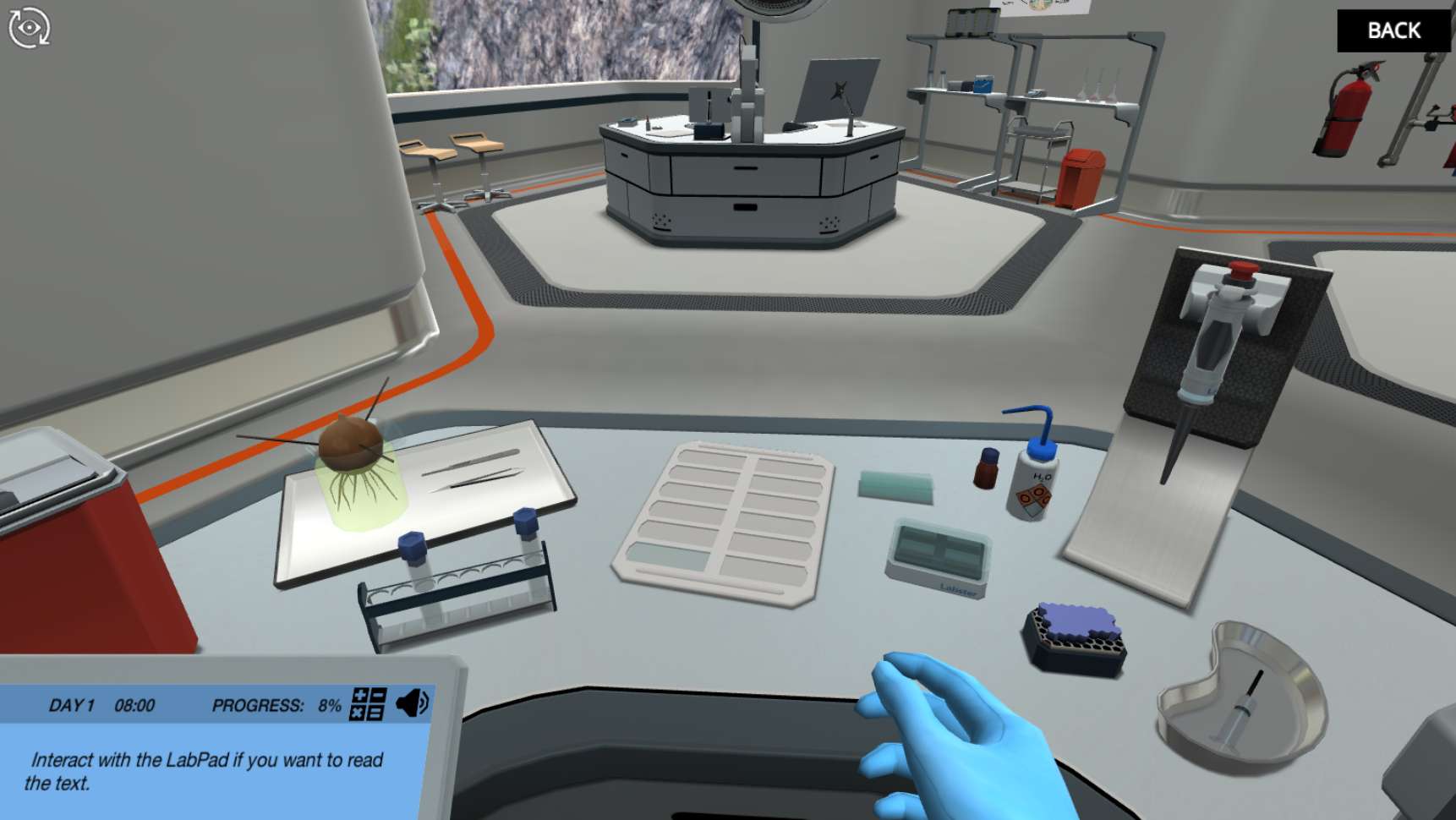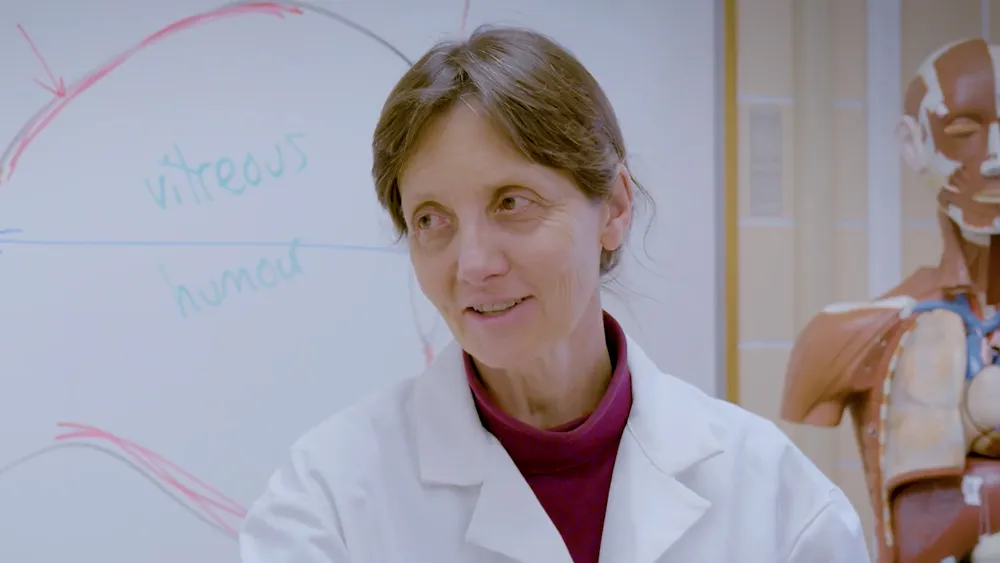Heading 1
Heading 2
Heading 3
Heading 4
Heading 5
Heading 6
Lorem ipsum dolor sit amet, consectetur adipiscing elit, sed do eiusmod tempor incididunt ut labore et dolore magna aliqua. Ut enim ad minim veniam, quis nostrud exercitation ullamco laboris nisi ut aliquip ex ea commodo consequat. Duis aute irure dolor in reprehenderit in voluptate velit esse cillum dolore eu fugiat nulla pariatur.
Block quote
Ordered list
- Item 1
- Item 2
- Item 3
Unordered list
- Item A
- Item B
- Item C
Bold text
Emphasis
Superscript
Subscript
About This Simulation
Join a cell biology research group to find out how a poisonous compound from a yew tree can be used in cancer therapy. You will be immersed in an animation of a human cell and use light and fluorescence microscopy to study cell division.
Learning Objectives
- Understand and visualize basic concepts about eukaryotic cells such as main cellular components and DNA packaging by immersive animations
- Understand the key characteristics of the cell cycle's different stages: interphase (G1, S and G2) and mitosis
- Use different microscopy techniques to observe the different phases of the mitosis (Prophase, Metaphase, Anaphase, Telophase) and describe their main characteristics
- Explain the cell cycle checkpoints and name the molecules that control them (cyclins and cyclin-dependent kinases) and their function
- Describe the main differences between mitosis and meiosis
About This Simulation
Lab Techniques
- Light microscopy
- Fluorescence Microscopy
- Sample preparation
Related Standards
- HS-LS1-4
- Topic 4.6: Cell Cycle
- 1.6 Cell Division
Learn More About This Simulation
How can a toxic compound be used in medicine? Paclitaxel, isolated from yew trees, can kill large animals like horses but is also used in cancer therapy. In this simulation, you will learn how cells divide and how they are affected by poisonous paclitaxel.
How is DNA packaged?
Start by diving into a blood sample to find out how DNA is packaged in an immersive animation of the cell. Find the DNA inside the nucleus and then zoom in from the chromosomes all the way to individual nucleotides.
Use microscopy to study mitosis
Understand the different stages of mitosis through interactive graphics and quiz questions. Then, prepare a sample of onion cells to observe the phases of mitosis and find out how each phase contributes to successful duplication of the cell. By now, you will understand enough about mitosis to replicate the process in a computer model.
Test the effect of paclitaxel
Finally, combine all your new skills and knowledge to test the effect of paclitaxel on cultured cells. Will the compound inhibit or accelerate cell division? How will it affect cancer cells or animals who eat the yew tree?
For Science Programs Providing a Learning Advantage
Boost STEM Pass Rates
Boost Learning with Fun
75% of students show high engagement and improved grades with Labster
Discover Simulations That Match Your Syllabus
Easily bolster your learning objectives with relevant, interactive content
Place Students in the Shoes of Real Scientists
Practice a lab procedure or visualize theory through narrative-driven scenarios


FAQs
Find answers to frequently asked questions.
Heading 1
Heading 2
Heading 3
Heading 4
Heading 5
Heading 6
Lorem ipsum dolor sit amet, consectetur adipiscing elit, sed do eiusmod tempor incididunt ut labore et dolore magna aliqua. Ut enim ad minim veniam, quis nostrud exercitation ullamco laboris nisi ut aliquip ex ea commodo consequat. Duis aute irure dolor in reprehenderit in voluptate velit esse cillum dolore eu fugiat nulla pariatur.
Block quote
Ordered list
- Item 1
- Item 2
- Item 3
Unordered list
- Item A
- Item B
- Item C
Bold text
Emphasis
Superscript
Subscript
A Labster virtual lab is an interactive, multimedia assignment that students access right from their computers. Many Labster virtual labs prepare students for success in college by introducing foundational knowledge using multimedia visualizations that make it easier to understand complex concepts. Other Labster virtual labs prepare learners for careers in STEM labs by giving them realistic practice on lab techniques and procedures.
Labster’s virtual lab simulations are created by scientists and designed to maximize engagement and interactivity. Unlike watching a video or reading a textbook, Labster virtual labs are interactive. To make progress, students must think critically and solve a real-world problem. We believe that learning by doing makes STEM stick.
Yes, Labster is compatible with all major LMS (Learning Management Systems) including Blackboard, Canvas, D2L, Moodle, and many others. Students can access Labster like any other assignment. If your institution does not choose an LMS integration, students will log into Labster’s Course Manager once they have an account created. Your institution will decide which is the best access method.
Labster is available for purchase by instructors, faculty, and administrators at education institutions. Purchasing our starter package, Labster Explorer, can be done using a credit card if you are located in the USA, Canada, or Mexico. If you are outside of North America or are choosing a higher plan, please speak with a Labster sales representative. Compare plans.
Labster supports a wide range of STEM courses at the high school, college, and university level across fields in biology, chemistry, physics, and health sciences. You can identify topics for your courses by searching our Content Catalog.
















